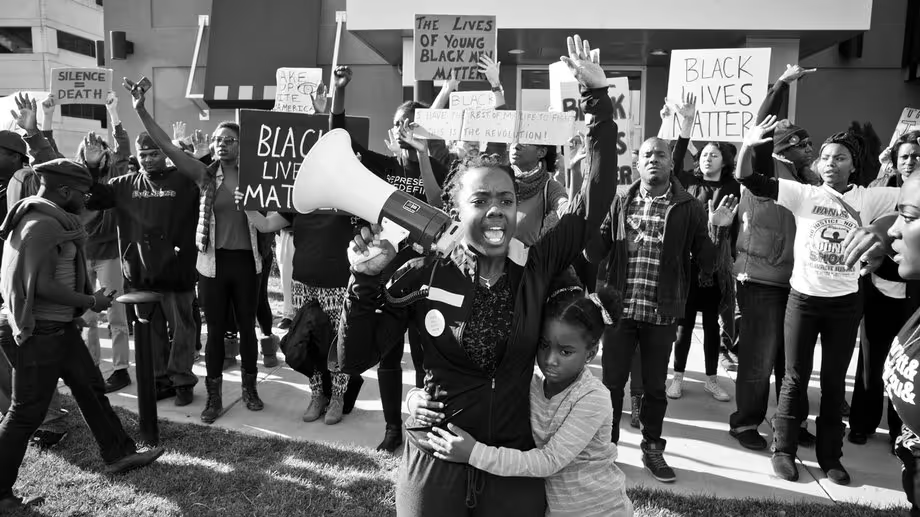Whose Streets? Lesson Plan Activity
Activity

Socratic Seminar
Knowledge and working definitions of the following academic vocabulary words and knowledge of the following public figures are necessary to discuss Whose Streets?
allegiance
citizenship
classism
cultural appropriation
equity
Ferguson, Missouri
indivisible
micro-aggression
power
police brutality
privilege
racism
sexism
Bob McCulloch
Jay Nixon
Barack Obama
Ron Thompson
Step 1: As students view the clips, require them to take notes by asking questions of/about Whose Streets? throughout the viewing.
Watch Clip 1 and Clip 2. Then, conduct a gallery walk to display and discuss images of police dogs in Ferguson juxtaposed with images of police dogs from the 1960s Civil Rights Movement era.
Watch Clip 3. Speaking of the lessons she wishes to impart to her daughter, Brittany Ferrell says, "Resist and participate in democracy. That is your right and it cannot be taken away from you.” Critically analyze this quote with students.
Review with students how Socratic seminars work: They are question-driven discussions named after the great philosopher Socrates, who used questions to teach his students. In these discussions people don’t talk over one another. They listen to each other’s comments respectfully; they don’t attack anyone’s opinions, and they agree to disagree.
Step 2: Split students into two groups. Instruct students to form two concentric circles. Group A should sit in the inner circle and Group B in the outer circle.
Step 3: Assign each person in Group B a partner in Group A. The Group B students should sit across from their partners in Group A, so that they can keep track of their partners’ comments and responses. At the end of the seminar the Group B students will give their partners feedback and constructive criticism about their participation in the discussion.
Step 4: Pass out at least three strips of paper to each member of Group A and instruct them to write their names on each slip. When a student wants to make a comment, he or she must drop a slip of paper on the floor inside the circle. In order to get full credit for this activity, each person must use all of his or her slips.
Step 5: Explain that you are a silent facilitator: Students should not look to you for justification or a change of direction for the discussion. They are responsible for answering each of the questions, and they may not move on to a new question if the one at hand hasn’t been thoroughly addressed.
Step 6: Pass out a list of open-ended questions that refer to the film. Explain that only the people in Group A are allowed to speak during the discussion. Everyone in Group B must remain silent during the discussion and observe their partners in Group A. Below are some essential questions to consider:
● Is the American dream the same for African Americans as it is for white Americans? Explain.
● What constitutes citizenship? How do we expand our current definition of citizenship to include a broader understanding of civic belonging and identity?
● As a society, how do we build/create cross-racial empathy, communal responsibility and a shared commitment to equality?
● How do racism, classism and sexism pervade daily American social and cultural life?
● As students, how do the topics from Whose Streets? explored in today’s Socratic Seminar impact your views of our global community? Explain.
● How should different communities assert their rights to freedom and humanity in the United States and in countries across the globe?
● Are there social norms and value systems of American society that contribute to the violation of the human rights of black people?
● How do queer identity/homophobia and activism intersect in the black community?
● What does it mean to create a generation of activists?
Step 7: Give the students a specific amount of time for the discussion and let them begin.
Step 8: When the discussion is over, have the Group B people give constructive feedback to their Group A partners. Afterward you may give overall feedback to the whole group.
Step 9: Have students switch groups and repeat steps 7 and 8.
Step 10: As an optional homework assignment, invite students to write journal entries about their personal interactions with police or the court system. This can be used as a Think-Pair-Share-Do Now activity for students on the day following the Socratic seminar.

